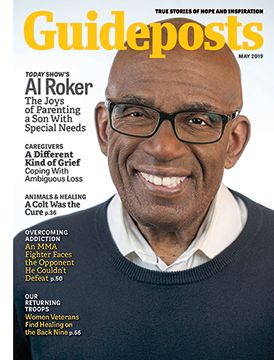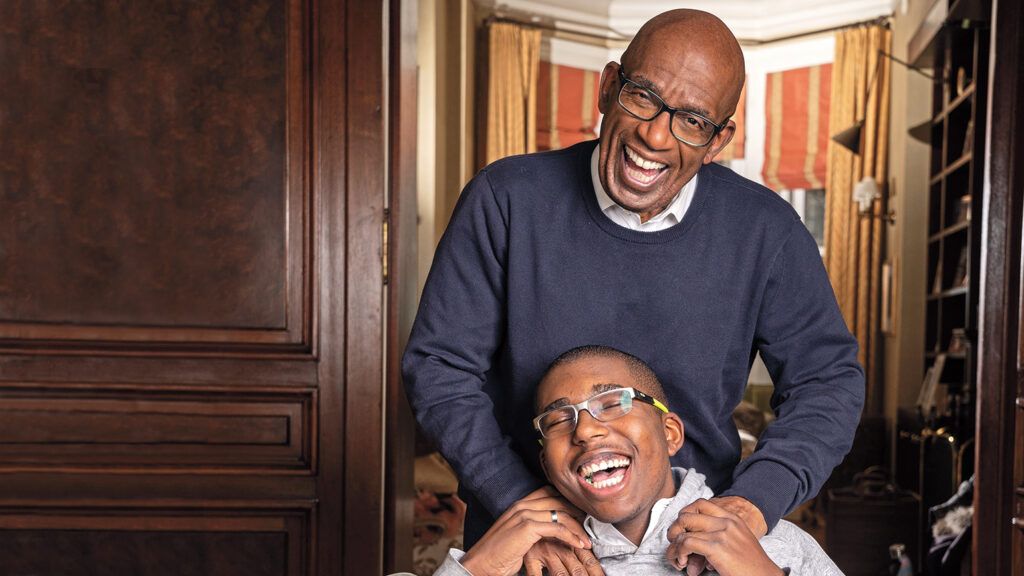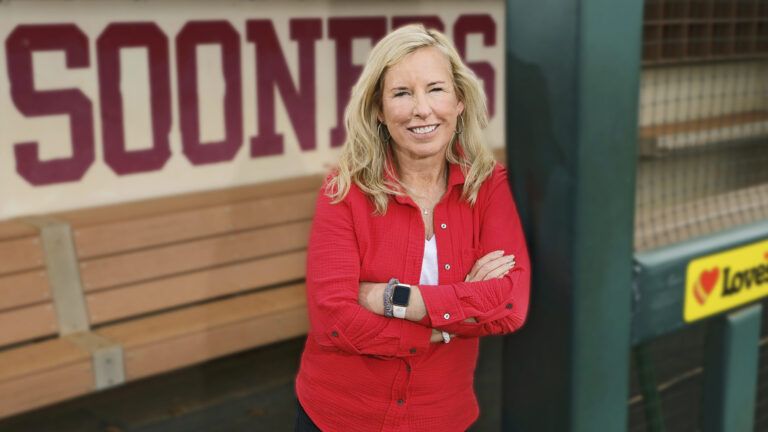We’d spent the weekend at our house upstate, my teenage son, Nick, and me. My wife, Deborah Roberts, is a senior correspondent for ABC News. Nick’s sister Leila is at college, and his oldest sister, Courtney, is grown. Sometimes it’s good for just the two of us guys to get away. That drive up and back is some of the best time we have one-on-one. You know, when you have your teenager in a car with you, it’s a good chance to connect—if Nick doesn’t spend too much time distracted by his iPad or phone. Focus and conversation can be a problem for my son, more so than most kids, as he is a kid with special needs.

issue of Guideposts magazine
It was a Sunday and we had gotten up early—not my usual 3:45 a.m. wakeup for the Today show but still pretty early. We were driving back to Manhattan and hoped to make it in time for the morning worship service because back home, at St. James Episcopal Church, Nick is a crucial part of the worship team and he takes his responsibilities very seriously.
It’s not something Deborah or I would have expected. To see Nick process down the center aisle at the beginning of the service, carrying the cross, his eyes on the altar, our pastor and the other ministers following behind, the organist pulling out all the stops, the choir and congregation singing their hearts out, the other acolytes following his lead as the principal cross bearer. Nick is focused, dignified, reverent, the brass cross shimmering in the candlelight. “You must be proud of your son,” someone will say.
Yes, I am. More than they’ll ever know. The obstacles in this kid’s way were things that might have tripped up many others. Not Nick, not even with the disabilities he was born with.
That morning, driving into town, I looked at the dashboard clock and considered the traffic—where was everybody going so early in the morning? But I was determined we would make it. I know it’s important to him. Recently, explaining to Deborah why being at church was a priority for him, Nick told her, matter-of-factly, “Mom, I’m a churchgoing guy.” Not your average teenager at all.
I went to church when I was growing up in Queens, but in those days, everybody did. It was expected. Mom and Dad took us to worship every weekend, but in so many other ways my dad was not your typical 1950s dad. For one, he was really in touch with his emotions. He cried easily, laughed hard and hugged and kissed us kids a lot. I remember going off to college, to SUNY Oswego, in upstate New York, getting my first taste of freedom. That day I left, Mom put on a brave face. Dad was a puddle of tears.
Read More: Lauren Daigle: God Showed Me My Future
The comfort he had with his emotions was a good model for me when I entered parenthood. Children can test your patience. Even an even-tempered guy like me can raise his voice. But I always knew I was loved. Dad’s hugs and kisses said as much. I try to do the same. I don’t always succeed, but with Deborah’s help and cajoling, I try.
When Deborah and I got married, we knew we wanted children. My older girl, Courtney, was adopted during my previous marriage, but we wanted to add to our family. When we first found out we were pregnant, we were over the moon. The miscarriage that followed broke our hearts. We ended up doing in vitro fertilization, and after a few attempts, we welcomed Leila into this world. I told that story in Guideposts in 2003. “Science may have helped us on our path to pregnancy,” I wrote back then, “but it couldn’t get us all the way to the end. The only thing that could do that was the power and grace of God.”
Leila was a walking miracle. We wanted to tell the world. We were just as thrilled when her brother, Nick, was born, four years later. He too was an answer to prayer—like all children—but we knew right from the beginning that he would be up against a whole different set of challenges. He wasn’t developing as fast as he should have, not holding our fingers as tightly, not always meeting our gaze, not as quick to crawl. At three, he hardly talked and could barely walk.
Doctors and specialists put him through a slew of tests. Was it cerebral palsy? Autism? Maybe it was a processing disorder. Now that he’s 17, I can tell you that, yes, he’s somewhere on the spectrum and maybe obsessive-compulsive. But those labels can be frustrating; they don’t begin to describe who Nick really is.
He started working with speech, behavioral and occupational therapists, developing strength, conversational skills and mobility. We enrolled him in a program at a school to suit his needs, watched him make friends, signed him up for tae kwon do—at his insistence—and took him to Sunday school. I had my doubts about the tae kwon do.
Read More: ‘This Is Us’ Star Chrissy Metz on Resilience
Nick blossomed, far more than Deborah or I could have ever expected, given his original iffy prognosis. In tae kwon do, you have to master systematic sequences of moves to progress to the next level. Turned out that all those repetitive drills were just the thing for Nick. Where his OCD nature can be a drawback in some situations, it was a strength here. And he proved to be very competitive. “I’m going to get my black belt,” he told us.
“Don’t push it,” I wanted to say, “You don’t have to aim so high.” You hate to see your kid disappointed. But who were we to hold back our son? His sister Leila was doing tae kwon do too, and maybe he wanted to prove something to her—and to himself.
He did earn his black belt—Leila got her red belt, one notch below. Deborah and I were pleased for both of them. After that, though, Nick decided he’d achieved his goal and was ready for other challenges. Since then he’s been taking swimming, chess and basketball lessons. And then there is church.
St. James does a good job of getting kids involved. There are sermons for kids, children’s choirs, Sunday school, playgroups, a Christmas pageant with parts for everybody as well as that corps of acolytes. On Sundays when I was feeling really down about Nick—wondering where our son would find his place in this world—I found it a comfort to note that some of the acolytes also had special needs. One performed his duties in a wheelchair; another had Down syndrome.
Nick watched and wanted to join them. And the folks who oversaw the acolytes were happy to have him.
I have seen how kids’ minds seem to wander during worship—I’ll admit mine does too sometimes. Truth be told, Deborah is really the spiritual shepherd of our family flock. I tend to bolt after church to do grocery shopping while Deb mingles with our congregation.
But ever since he’s become an acolyte, Nick has the clearest focus, Sunday after Sunday. Those qualities that you might think would hold him back are exactly the ones that drive him forward. If I thought tae kwon do was all about form and purpose, so is this. Lighting the candles, carrying a torch, holding up the Bible for the lesson to be read and marching down the center aisle with the cross, concentrating on that altar. On Sundays he serves the Lord.
Read More: ESPN’s Maria Taylor Relies on Faith to Guide Her Career and Life Decisions
Nick is a hard worker; he’s got a great sense of humor; he’s outgoing and a good swimmer; he’s developing a pretty good top-of-the-key basketball shot. He takes chess lessons a couple times a week, and he does okay. He’s also very affectionate—like his grandfather—and full of love to share.
Do I get frustrated with my son sometimes? You bet. But then I remember my dad, how understanding he was. And Deborah reminds me that I have to show my son not only that I love him but that I like him as well. More than that, I admire him.
But let’s be clear about something: When you parent a kid, it’s not just the two of you; there’s a third party helping. I can’t begin to take credit for who Nick is and who he might become. All sorts of specialists can tell you about limitations for this and that. Nick never got that message.
Last year, he went on a mission trip to Haiti with teens from church, helping out at an orphanage, reading to the kids, playing games with them, doing chores. When we picked him up at the airport, the first thing he said in the car was “I can’t wait to go back.”
Until then I have to make sure we get to church on time—no matter what. After all, my son is a churchgoing guy.
For more hope and inspiration, follow us on Instagram: @guidepostsmagazine
For more inspiring stories, subscribe to Guideposts magazine.






